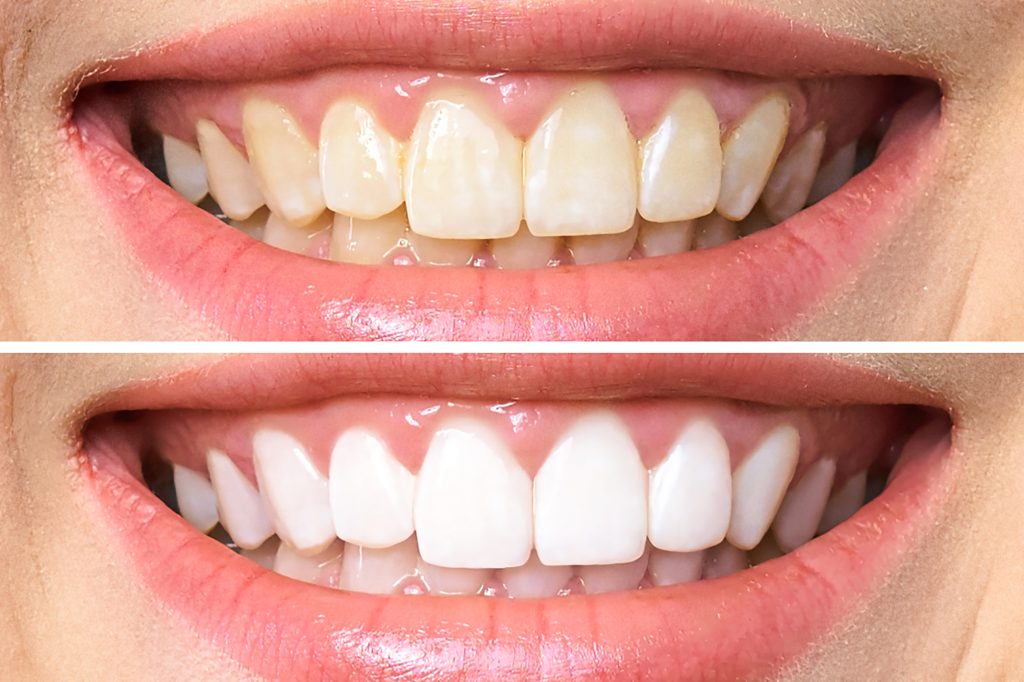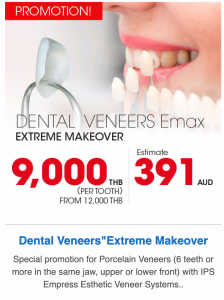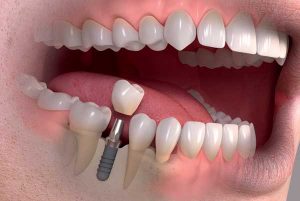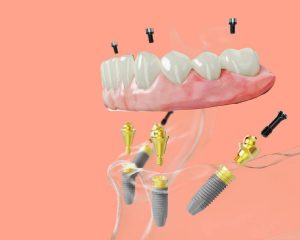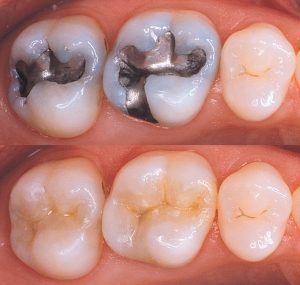If you are reading this article you probably want to undergo this procedure and are wondering how long does teeth whitening last? This treatment is based on the modification of the color of the teeth through a wide range of techniques.
Each technique has an approximate duration, which can vary from weeks or a couple of months for those performed at home and up to approximately 2 years in the case of whitening performed in the office by a professional.
It is worth pointing out that the duration will also be given by other factors that we will mention later, so if you are interested in knowing a little more about this increasingly popular procedure among patients we recommend you to keep reading!
What is teeth whitening?
First of all, it is important to define what whitening is: It is a procedure that aims to reduce or eliminate stains and reduce the color of teeth in various shades. To perform it, biocompatible whitening substances are used with the dental tissue.
How long does teeth whitening last?
To answer the question how long does teeth whitening last, the following factors must be taken into account:
-The type of technique and whitener used. Professional procedures last longer than home procedures, up to 2-3 years approximately. While home procedures have less visible results and can last for weeks or months.
-The patient’s oral hygiene habits and care during the maintenance stage. Therefore, if you want the results to last longer, you should brush properly after every meal and avoid consuming certain foods and beverages with a lot of coloring.
Intrinsic vs. Extrinsic Stains
It is important to keep in mind that the result of teeth whitening will also depend on the type of discoloration or stains present on the teeth. These can be divided into two groups: intrinsic or internal and extrinsic or external.
– Intrinsic: They can be the result of aging, blows or fractures to the teeth (which turn them bluish or gray), infections and medications such as tetracyclines that can cause deep stains if taken during the period that corresponds to the formation of permanent teeth. This type of pigmentation is the most difficult to remove.
– Extrinsic: Resulting from the ingestion of dark carbonated beverages, coffee, tea and/or red wine, harmful habits such as smoking. Or also by prolonged use of the oral antiseptic Chlorhexidine.
Most popular whitening treatments
At-home procedures: These include over-the-counter products that help reduce pigmentations.
Whitening toothpaste
Results can be seen in about a month of use and can be maintained for 3-4 months.
Those containing whitening substances such as hydrogen peroxide or carbamide peroxide offer better stain removal results than those containing only abrasives to reduce surface stains.
In general, whitening toothpastes can be used every day or several times a week to prolong their results, but some people have reported tooth or gum sensitivity with prolonged use, and they can also weaken enamel. It is therefore recommended to alternate them with conventional toothpastes.
Whitening mouthwash
With daily use, surface stains may begin to fade approximately 3 months after starting to use the whitening mouthwash.
Ideally, it should be used in conjunction with other procedures to enhance and prolong the whitening effect, as it is not very effective on its own.
Whitening strips
When high quality whitening strips are used correctly, results can be obtained for up to 6 months, not only whitening teeth, but also being able to reduce/remove light extrinsic and intrinsic stains.
These use the whitening substance hydrogen peroxide and some may use LED lights to enhance the stain removal process.
Their use should be controlled because if they are used too frequently they can cause sensitivity or damage the health of the tooth tissue.
Whitening pens
The results obtained with the whitening pen are usually minimal and of short duration, being observed in approximately 5 days. For this reason, its use is recommended to eliminate specific stains on the dental surface.
After the application of the whitening gel, no food or beverages should be consumed for one hour.
At-home whitening gel trays
Although there are home products that achieve relatively effective results as is the case of some whitening strips, the reality is that most are not as effective as teeth whitening indicated by a dentist, which would be the case of whitening gel trays for home use.
With this treatment the results become visible in 1 or 2 weeks, remaining from months to a year, which could last with proper oral hygiene care.
It should be noted that this type of whitening can only be performed under the supervision of a dentist since its indication is done after a process of clinical evaluation and planning of the procedure.
This is in order to have the appropriate duration and frequency of use, which may vary from patient to patient depending on their condition. In addition, the bleaching agent used has a stronger concentration than over-the-counter products.
The gel is applied in a tray adapted to the patient’s arch to avoid contact with the gums and, therefore, possible lesions or hypersensitivity.
In-office tooth whitening procedure
If the patient maintains good oral hygiene, this procedure should provide lasting results for 1 to 3 years.
In this case, the dentist applies hydrogen peroxide or carbamide peroxide to the front surface of the anterior teeth after protecting the gum with an insulating material. They may also use an LED light source after applying the whitening substance to accelerate the process.
For this technique to be carried out, the teeth must be completely healthy and free of inflammation, that is, free of diseases such as tooth decay and periodontal disease. In addition, a prophylaxis must have been performed to remove dental plaque and tartar.
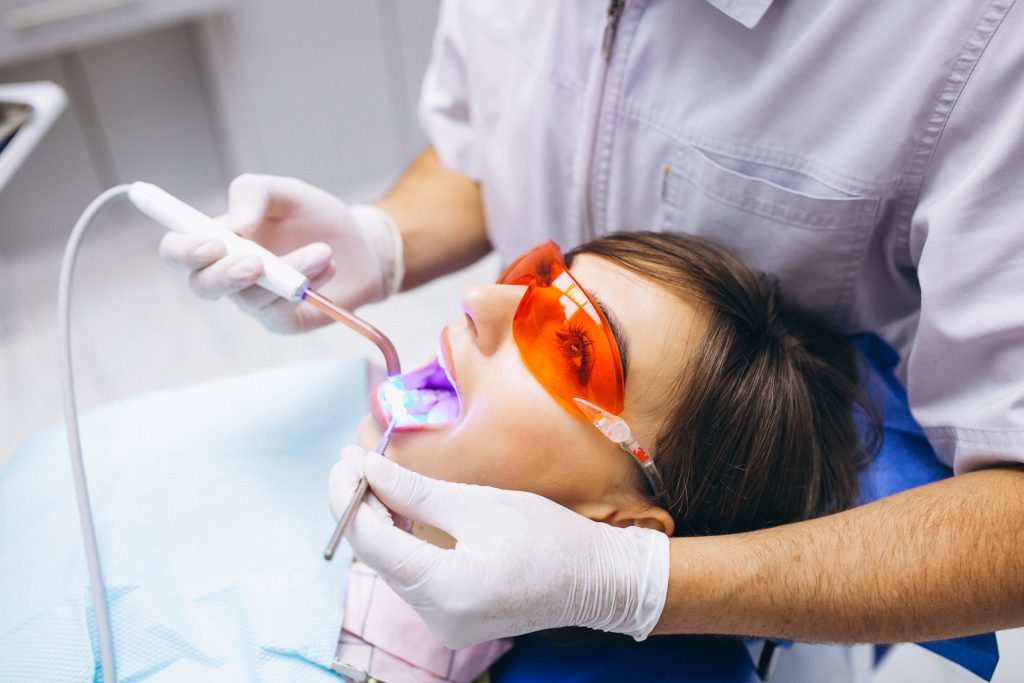
Are there side effects from teeth whitening?
– Although it is a painless procedure, in some patients it can generate a certain degree of sensitivity in the teeth, especially with prolonged use. This is due to the action of the active substances of the whitening agents or of the abrasives. If it occurs, it is not usually long lasting.
– Gum burns and irritation: This can occur when whitening is performed with a gel tray or in the dental office, and is due to the fact that the soft tissue area was not adequately covered with the insulating material or the tray used was not correctly adjusted to the size of the patient’s arch. This type of injury is usually mild and temporary.
– Bleaching of the gums: The gums may lose their color for a short period of time.
– Gastrointestinal irritation or discomfort: If the patient accidentally ingests the bleaching agent, a burning sensation in the throat or slight stomach upset may occur.
– Damage to tooth tissue: Very strong or abrasive bleaching agents can weaken tooth enamel. Hence the importance of using a good quality product and following the manufacturer’s instructions.
Now that you know how long does teeth whitening last, you can choose the technique that best suits your needs keeping in mind that whitening is a viable treatment for those who wish to reduce or eliminate stains on the surface of their teeth without having to undergo more invasive dental procedures.
Sign Up and Get a Free Consultation and a Treatment Quote today, Via DentistConsultationHub.com







